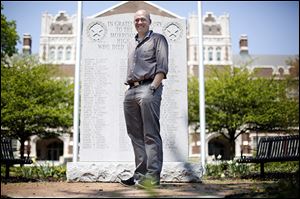
Teacher chosen for service
Waite instructor joins WWII history project
5/8/2015
Waite High School teacher Joe Boyle, in front of the memorial dedicated to students who died in World War II.
Seventy years after German troops surrendered, World War II remains vividly real and relevant in Joe Boyle’s classroom.
The Waite High School history teacher is one of 18 middle and high school teachers from the United States and abroad selected for a program that will develop curriculum to help other teachers bring to life lessons from the war.
The first phase, launched this week, is timed to mark today’s anniversary of Victory in Europe Day.
On May 8, 1945, the United States celebrated the end of the war in Europe, though fighting continued for months in the Pacific.
A new online teacher resource at abmceducation.org features information on overseas military cemeteries administered by the American Battle Monuments Commission, which partnered with the nonprofit organization National History Day and George Mason University to support the project.
Mr. Boyle and the other teachers are developing lesson plans that will be available on the website for teachers to use at no cost.
“You are not going to understand the 20th century unless you understand World War II,” said Mr. Boyle, 40.
The teachers will take a whirlwind European tour this summer, including stops at military cemeteries and other significant war sites.
Mr. Boyle had completed a program sponsored by National History Day that inspired his Fallen Hero Project. He assigns students to learn about a local military member who died in World War II.
His approach has made him a favorite among students, said Brian Murphy, Toledo Public Schools chief of staff. Mr. Murphy called Mr. Boyle “one of the top teachers in the district.”
Selected from a pool of more than 120 applicants for the current initiative, Mr. Boyle will conduct more research on the two men whose service will inspire his lesson plans.
Coast Guard Seaman 1st Class Edwin Frazier, a former Waite student, was lost at sea on March 9, 1944, when the USS Leopold came under torpedo fire from a German U-boat.
Mr. Frazier, just weeks shy of his 19th birthday, is memorialized on the Tablets of the Missing at Cambridge American Cemetery in the United Kingdom and also on a marker on Waite’s lawn that lists those from the high school who died in the war.
The blue-eyed East Toledoan nicknamed “Budd” dropped out his junior year and joined the Coast Guard in 1942, Mr. Boyle said.
The teacher collected military and school records as well as logs from a ship traveling near the destroyer escort on which Mr. Frazier was serving.
A three-paragraph letter from the Coast Guard to Mr. Frazier’s mother confirmed the news that her son was missing in action.
“The anxiety this distressing report has caused you is fully realized,” read the typewritten message.
Mr. Boyle’s research revealed that the young man had taken enough classes during his Coast Guard apprenticeship to receive a posthumous diploma, which will be presented during Waite’s Memorial Day program.
This summer, Mr. Boyle will visit the cemetery in England where Mr. Frazier’s name lives on.
Mr. Boyle will also visit Normandy American Cemetery in France, where his great-uncle Sgt. Paul Boyle, the second subject of his studies, is buried.
Sergeant Boyle was killed by a German sniper while setting up a machine gun in a hedgerow about 15 miles from Omaha Beach. It was July 26, 1944, the start of Operation Cobra.
“My Uncle Paul is the reason I had gotten interested in history as a little kid,” Mr. Boyle said.
As the teacher researched his relative, who was born in Pennsylvania and later moved to Cleveland, his story of sacrifice began to take shape.
Now Mr. Boyle is turning that story and his research into Mr. Frazier’s service into lesson plans.
Most of the materials created by participating teachers — who teach a variety of subjects including science, social studies, and art history — will be available online in November, with the complete curriculum posted by February, said Timothy Nosal, who works for the monuments commission and is managing the project.
The commission’s hope is that if teachers develop the lesson plans, the result will be something that other instructors will want to use, Mr. Nosal said.
“You can use the war and personal stories from the war to learn about all kinds of different things within the curricular restraints that every state has right now,” Mr. Boyle said. “All of our lessons use the individual man to tell a much larger story.”
Contact Vanessa McCray at: vmccray@theblade.com or 419-724-6065, or on Twitter @vanmccray.